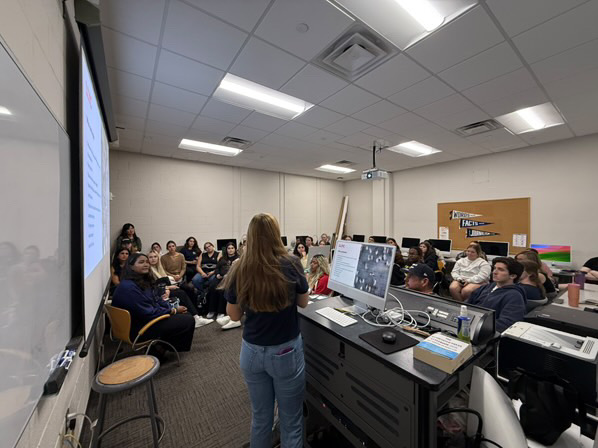The Psi Chi Honor Society hosted an informative workshop on the Graduate Record Examination (GRE) on April 8 in the Lake Huron room in the OC.
This is a reoccurring event hosted by Psi Chi and any faculty member within the Department of Psychology at OU for all students interested in taking the GRE for prospective graduate programs.
Dr. Melissa McDonald, personality and evolutionary psychologist, provided a slideshow explaining how to endure the GRE.
“The GRE is intended to test general intellectual ability and your likelihood of success in graduate school,” McDonald said. “It’s often used to differentiate between applications in a standardized way.”
She explained the need for the test with the new changes to many graduate programs.
“The COVID-19 pandemic changed the university requirements to dropping the GRE,” McDonald said. “Universities are struggling with whether to return to requiring it or making it optional.”
McDonald addressed the concerns with the GRE and why it’s deemed unnecessary for some universities.
“It is a valid predictor of performance in graduate school, but it has potential biases,” McDonald said. “Men typically score higher than women, racial and ethnic minorities tend to score lower, so there are concerns of applying it with the biases. “
She provided insight into the scheduling process for taking the test and the financial concerns to consider.
“The test can be expensive, so you want to know what programs you intend to apply to when taking the GRE and whether or not they require it,” McDonald said.
The workshop introduced students to study materials provided by libraries and online courses through Kaplan or Khan Academy.
McDonald emphasized the points in which it would be time to enroll for a testing session.
“When studying, you’ll find that as you take more practice tests, maybe your scores aren’t changing much anymore,” McDonald said. “This could mean it would be a good time to take the test.”
The event granted students an understanding of the scheduling process when determining how to prepare.
“Set a certain number of hours that you’re going to study every week,” McDonald said. “Make sure to study the basic things as much as possible before reviewing the more advanced parts.”
The test can be overwhelming for any prospective graduate student, and this was emphasized in the workshop.
“Take a minute to reset mentally and do some deep breaths before tackling the next part,” McDonald said.
McDonald focused on the nervousness felt when studying and the actual test date with an assertive approach to not rush throughout the questions.
“When you’re feeling anxiety, try to reframe it in your brain that it doesn’t mean you’re not prepared,” McDonald said. “It’s your body’s way of preparing itself to meet the challenge you’re faced with.”
Students were advised to get involved with activities outside of the GRE to strengthen their applications for graduate programs.
“Demonstrate your competence in another way that shows your ability to succeed in your desired program,” McDonald said.
For more information about Psi Chi and documents related to the GRE, visit their website or GrizzOrgs.







